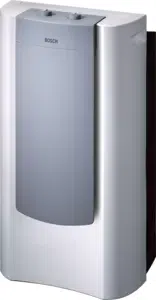Loading ...
Loading ...
Loading ...

25
Requirements for use
When the appliance is turned off and then
turned back on, it takes the compressor 3
minutes to start up again. This period of
time is required in order to ensure correct
operation.
Avoid direct contact with the air expelled
through the expulsion tube.
Transportation requirements
The appliance is fitted with wheels to make it
easier to move around. If necessary, you can
tilt the appliance in order to move it. You
should not turn the appliance back on again
for a minimum period of one hour after
performing this procedure.
❏ Before tilting it, empty the condensed water
from the internal tank by extracting the
water drainage pipe from its housing and
removing the plug, Fig. 7. Do not forget to
replace the plug and reinsert the pipe in its
housing when the tank is empty.
Instructions for Use
Cooling
The appliance cools and dehumidifies the air
in the room at the same time in order to create
a pleasant atmosphere.
❏ Plug the appliance into the mains electricity
supply.
❏ Lead the hot air expulsion tube outside. In
order to avoid excessive noise and
efficiency loss, the air expulsion tube should
be positioned as shown in Fig. 14. See
“Ways of releasing air outdoors”.
❏ Check that the plug, Fig. 1, is fitted on the
drainage pipe to prevent water from leaking
onto the support surface.
❏ Lift the air director on the top of the
appliance. This air director is not installed
on the appliance on PAM18100 models.
See figures 25 and 26 in “Heating”.
❏ Select the maximum or silent
cooling function, Fig. 8. (The silent cooling
function reduces the air flow on the
appliance).
❏ Set the thermostat to the desired
temperature, Fig. 9. If the appliance turns
itself off automatically because the
thermostat trips, it is necessary to wait for
ambient temperature to rise 2-3°C before it
comes back on again.
Fig. 7
0
Fig. 8
20° 30°
°C
Fig. 9
Loading ...
Loading ...
Loading ...
